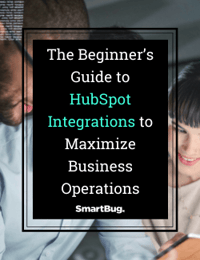
By Evens Sheehy
HubSpot is a powerful platform for customer relationship management (CRM)—including marketing, sales, and customer service—but when it comes to accounting, QuickBooks reigns supreme. It’s far and away the most popular accounting tool among small businesses.
If you depend on QuickBooks for your billing and invoicing and HubSpot for other core processes, this can create a bit of a snag without the right integration. With a HubSpot and QuickBooks integration, you can gain more transparency into your data across platforms, and you can save time and enhance consistency by automating follow-up processes.
Trying to Get By Without an Integration
If you don't do a HubSpot and QuickBooks integration, you’re likely taking one of these two approaches, both of which present problems:
Manually Transferring Data
Many of our clients who depend on both HubSpot and QuickBooks find themselves jumping back and forth between the platforms when it comes time for billing. For example, this might look like:
- Sending customer and transaction information from HubSpot to QuickBooks to create an invoice
- Emailing the invoice created in QuickBooks through HubSpot for tracking and analytics
This process can create a lot of manual work for your team—and allow human error to creep through.
Keeping Billing and Follow-Ups in QuickBooks
To avoid that clunkiness, some may use QuickBooks’ email feature to send invoices, keeping as much of the billing process as possible within the platform. However, this approach also poses some problems:
- You miss out on the analytics and workflow capabilities available through HubSpot.
- Other departments lack visibility into your accounting department’s billing communications with clients.
What Can a QuickBooks and HubSpot Integration Do?
An integration allows you to avoid both of the problematic approaches above and instead streamline your use of HubSpot and QuickBooks for billing. It allows data to move seamlessly from one platform to another so you can leverage the benefits of both without the need for manual data transfer.
With a HubSpot and QuickBooks integration, you can:
- Automatically share invoicing and billing information between both applications.
- Record billing histories that your whole team can easily reference.
- Automate consistent follow-up procedures and billing sequences.
The precise functionality of your integration will depend on your specific business needs and whether you stick to the native integration or custom build one (more on this later).

.webp?width=2554&height=1436&name=invoice%20sync%20(HubSpot%20%26%20Quickbooks).webp)
Benefits of Automating Follow-Ups with a HubSpot and QuickBooks Integration
The functionality you gain with a QuickBooks and HubSpot integration comes with some far-reaching benefits for your business. Let’s explore some of the biggest wins you can expect when you integrate your CRM and accounting software. These benefits extend across account management, accounting, sales, and even marketing teams.
1. Data Fidelity and Transparency
One of the biggest advantages of nearly any integration is the way it creates a unified view of your data. Jumping between applications, piecing together information, and manually transferring data is messy and time-consuming. Our salespeople know from experience the frustrations of having to ask accounting to send an invoice and then having no visibility into the process.
With a QuickBooks and HubSpot integration, you can keep data clean, accurate, and transparent across your applications. All your teams can easily see when an invoice was sent, whether the customer responded, whether any follow-up emails were sent, and when an invoice was paid.
2. Time Savings
A Harvard Business Review study found that the average employee toggles between different apps and websites nearly 1,200 times every day to do their job. Switching between applications can be a major time-suck on its own. Add in manual data transfer, and you’re looking at a lot of valuable time lost. With an integration, you can gain back this time.
You also save a tremendous amount of time by automating your follow-up processes through HubSpot. For example, when our team implemented a QuickBooks and HubSpot integration, we were able to automate the collection process, saving 60 percent of the time previously spent on this task.
3. Consistent Follow-Up Processes
Automation doesn’t just save you time; it ensures consistency. When you build a workflow or sequence in HubSpot for billing, you won’t have to ask yourself, “Did we send a follow-up email on that outstanding bill?” The follow-up email will go out at the appropriate time, without fail.
You can also leverage workflows and sequences to assist with marketing efforts in the case of memberships or other subscription-based products. For instance, when a customer’s annual membership is about to end, they can enter a HubSpot workflow that encourages them to renew.

4. Better Cash Flow
When your invoicing processes are efficient and consistent, you can expect to see improvements in your accounts receivable metrics, such as days sales outstanding (DSO). Fewer delays in the back-and-forth between your accounting team and customers equates to better cash flow for your business.
5. Account Insights
Finally, a QuickBooks and HubSpot integration can help you leverage HubSpot’s tracking tools for useful analytics and insights. You won’t wonder if a customer opened a follow-up email or how many times they viewed it, for example. All of that information will be easily accessible in HubSpot.
You’ll also automatically create a detailed billing history for each customer you work with, so your sales team can see in the future whether a customer tends to pay on time or whether they tend to be more problematic when it comes to paying. This information can help them as they create deal terms or determine which existing customers to focus on for additional sales.
How Do You Set Up a HubSpot and QuickBooks Integration?
Good news for anyone looking to cash in on the benefits above: HubSpot has a native integration with QuickBooks. That means you can sync your applications within HubSpot without much development expertise.
Here’s the catch: This native integration works great in certain situations, but it may fall short of meeting your team’s needs. For example, the native integration allows you to sync invoice numbers from QuickBooks to HubSpot but not the invoices themselves. If you want access to those PDFs in HubSpot, you’ll need a custom integration that makes that possible.
An accredited HubSpot integrations provider can build custom integrations using an application programming interface (API). With the custom-built integration, you can specify exactly what kind of synchronization you need between QuickBooks and HubSpot to enhance your team’s efficiency and the quality of your follow-up processes.
Even if you go with a native integration, partnering with an expert can help you avoid potential bumps in the road and get the most out of your integration.
Enhance Billing Efficiency and Consistency with a HubSpot and QuickBooks Integration
A HubSpot & Quickbooks integration can significantly enhance the efficiency and effectiveness of your billing processes. By automating data transfer and workflows, you can achieve greater data fidelity, save valuable time, ensure consistency in follow-up processes, and improve cash flow and customer insights.
Whether you opt for the native integration provided by HubSpot or invest in a custom integration tailored to your specific needs, you’re sure to start experiencing some very real benefits across your team. With a seamless connection between your CRM and accounting software, you can empower your team to focus on what matters most: building and nurturing valuable customer relationships while driving business growth.
Want to learn more about the power of integrations? Check out our e-book, The Beginner’s Guide to HubSpot Integrations to Maximize Business Operations!

About the author
Evens Sheehy is SmartBug's SVP of Sales - Canada. He is a marketing & sales mastermind and Inbound thought leader who has dedicated over 20 years of his career to sales and marketing. Evens is not only an expert in Inbound Sales and marketing with a multitude of certifications but also a certified HubSpot trainer. He shines in developing sales and marketing strategies, as well as in lead generation, covering both traditional and digital aspects. Read more articles by Evens Sheehy.








-2.png?width=800&length=800&name=Blog%20header%20image%20(1)-2.png)